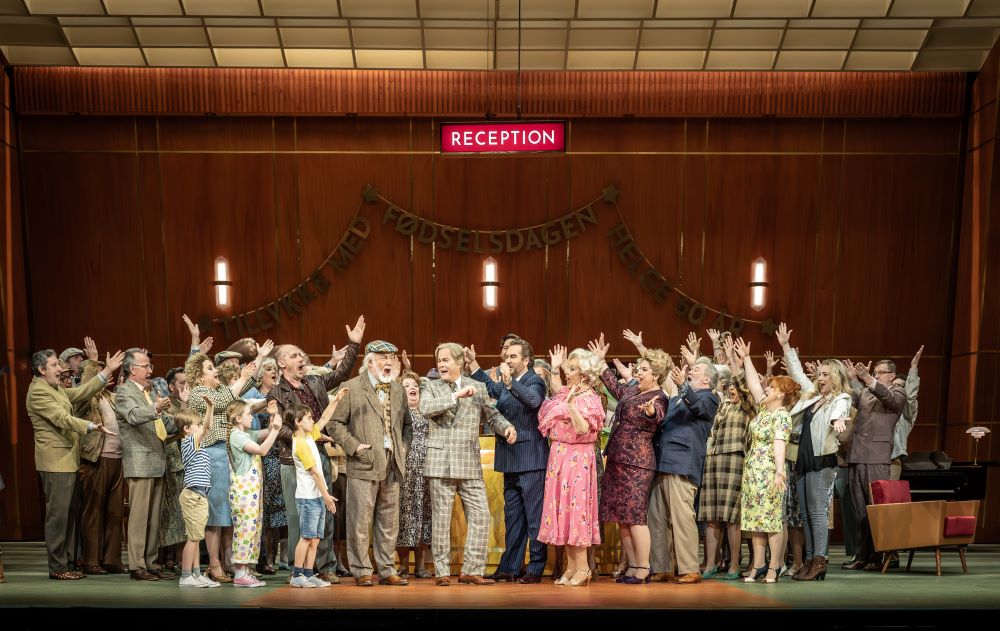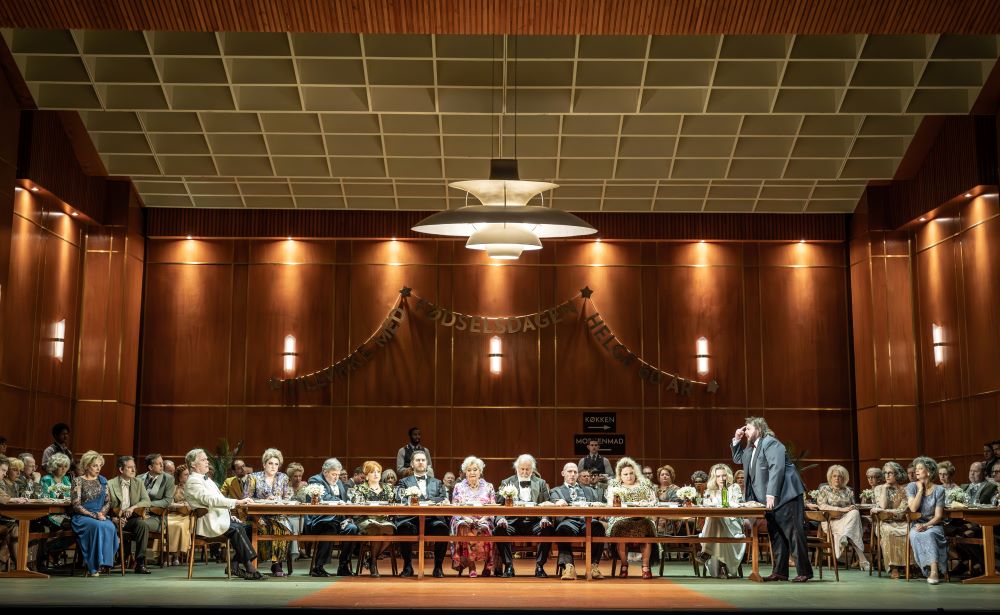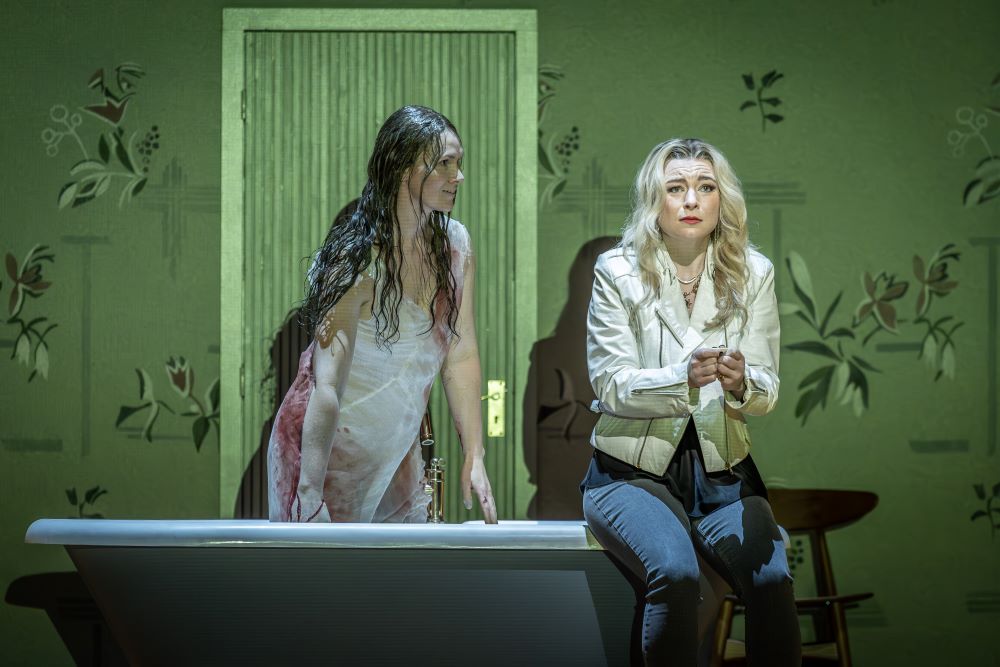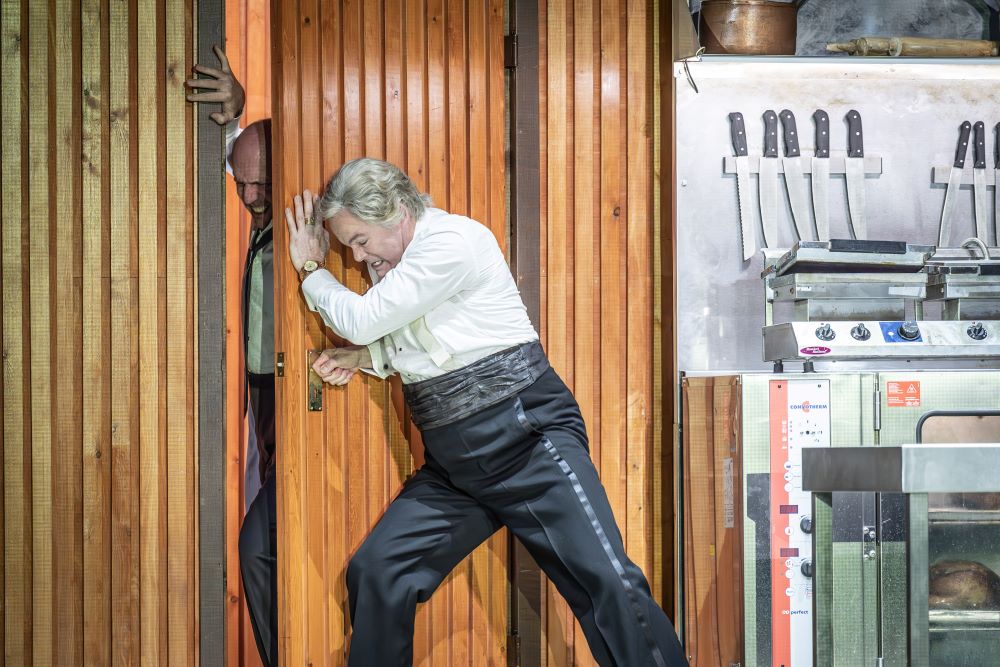So the Royal Opera had assembled a dream cast, conductor (Edward Gardner) and director (Richard Jones). The only question until last night was whether composer Mark-Anthony Turnage would be at his remarkable best. His operatic journey has been uneven, but one thing is now certain: adapting the first Dogme 95 movie, Festen by Thomas Vinterberg, so shocking at a time (1998) when the issue of child abuse rarely surfaced in drama, has yielded music theatre of flawless pace and range.
No-one should expect a faithful reflection of the film (which I haven't seen since its release knocked me for six and avoided before the operatic premiere), or for that matter the play (which I missed on its two London showings). Turnage has worked closely with librettist Lee Hall – best known for Billy Elliot, though he also did a superb job on the north-of-England rep-theatre Pagliacci as "Ding, Dong" at ENO for Jones – to make some radical interpolations. A chorus, really, in what's originally an intimate family drama? It works, and allows Turnage to write an effective "hello" ensemble in the first scene mirrored by a blithely creepy "good morning" one at the end: these people are determined to carry on as if nothing has happened in between, and the last "number" parallels the Borough going about its business as usual at the end of Britten's Peter Grimes.  The symmetries suit Jones's style, and with help from movement director Lucy Burge he knows how to manipulate 80 people around the stage when they're not sitting for the feast (pictured above: Helge, played by Gerald Finley, greeted by guests). Hall sets up the relationships deftly in the punchy opening scene, and the key speeches at what's supposed to be a celebration of hotelier Helge Klingefeldt's 60th birthday are precisely placed. Older son Christian's thunderbolt is delivered with shocking abruptness (one can never recapture Vinterberg's original coup), and Turnage doesn't overdo the tense musical language at this point where – spoiler alert – we learn that Helge constantly raped the boy Christian and his twin sister Linda, who has committed suicide before the action begins (pictured below: Allan Clayton gives the "home truths" homily).
The symmetries suit Jones's style, and with help from movement director Lucy Burge he knows how to manipulate 80 people around the stage when they're not sitting for the feast (pictured above: Helge, played by Gerald Finley, greeted by guests). Hall sets up the relationships deftly in the punchy opening scene, and the key speeches at what's supposed to be a celebration of hotelier Helge Klingefeldt's 60th birthday are precisely placed. Older son Christian's thunderbolt is delivered with shocking abruptness (one can never recapture Vinterberg's original coup), and Turnage doesn't overdo the tense musical language at this point where – spoiler alert – we learn that Helge constantly raped the boy Christian and his twin sister Linda, who has committed suicide before the action begins (pictured below: Allan Clayton gives the "home truths" homily).
The first of two dramatic silences is defused by the queasy half-forgotten recollection of Grandpa (John Tomlinson) and a brushing-aside of "imaginative" Christian's accusation. There's an even longer silence at the end of the other bookending speech, in which his living sister Helena reads the suicide note she found left behind by Linda, and Helge is damned forever.  Or is he? Vinterberg gave Helge a redemption which shouldn't have been acceptable then, and certainly isn't in 2025; Turnage and Lee reclaim it for the children by giving the ghost of Linda – who doesn't appear in the film – a monologue in which she quotes Julian of Norwich's "all shall be well, and all manner of things shall be well". Turnage doesn't let it become sentimental. The toughest of elegists, he knows what it means to lose a sibling; his brother Andrew's death from a drug overdose during work on an early masterpiece, Blood on the Floor, with its piercing saxophone laments, surely also informs the tragic later scenes of Anna Nicole. There are other set pieces which hit the mark: Grandma's poetic lyrics, grimly offset by the violence against Christian and poignantly sung by Sue Bickley, and the would-be-diversion of a conga which turns feral, adding another string to Turnage's wide-ranging bow.
Or is he? Vinterberg gave Helge a redemption which shouldn't have been acceptable then, and certainly isn't in 2025; Turnage and Lee reclaim it for the children by giving the ghost of Linda – who doesn't appear in the film – a monologue in which she quotes Julian of Norwich's "all shall be well, and all manner of things shall be well". Turnage doesn't let it become sentimental. The toughest of elegists, he knows what it means to lose a sibling; his brother Andrew's death from a drug overdose during work on an early masterpiece, Blood on the Floor, with its piercing saxophone laments, surely also informs the tragic later scenes of Anna Nicole. There are other set pieces which hit the mark: Grandma's poetic lyrics, grimly offset by the violence against Christian and poignantly sung by Sue Bickley, and the would-be-diversion of a conga which turns feral, adding another string to Turnage's wide-ranging bow.
The three crucial solos are delivered with breathtaking vocal focus and physical intensity by Allan Clayton, Natalya Romaniw and Marta Fontanals-Simmons (pictured below on the left with Romaniw). Rapist Helge comes less into focus, though Gerald Finley is charismatic as always; Else, the mother who saw what was going on, gives Rosie Aldridge more to get her teeth into during another speech, and her ultimate breakdown is spectacular. The wild, unpredictable youngest son Michael gets an explosive performance from Stéphane Degout (pictured at the door in the last photo, Finley's Helge trying to stall off the attack), with Philippa Boyle vivid as the partner in a love-hate marriage – very Bergmanesque, though more parodied in the music; it's interesting that Fanny and Alexander, with its opening Christmas feast punctuated by darker, more intimate confrontations, was a model for Vinterberg and has recently opened as an opera in Brussels.  Other characters are more sketchily drawn, though personably filled by the likes of Thomas Oliemans, Ailish Tynan, veteran Jeremy White and Peter Brathwaite as Gbatokai, Helena's boyfriend who's assailed by two racist attacks. With the possible exception of Christian's former lover Pia (Clare Presland), it's the music and the vocal writing – not quite on the Britten level, but with the text always clear, and better than Thomas Adès' hideous lines for the women in another recent ensemble success, The Exterminating Angel – which fill in what psychology there is. The ensemble's the thing. Better that than risking cameos that, in Bergman's words, show a "whoring after the public taste".
Other characters are more sketchily drawn, though personably filled by the likes of Thomas Oliemans, Ailish Tynan, veteran Jeremy White and Peter Brathwaite as Gbatokai, Helena's boyfriend who's assailed by two racist attacks. With the possible exception of Christian's former lover Pia (Clare Presland), it's the music and the vocal writing – not quite on the Britten level, but with the text always clear, and better than Thomas Adès' hideous lines for the women in another recent ensemble success, The Exterminating Angel – which fill in what psychology there is. The ensemble's the thing. Better that than risking cameos that, in Bergman's words, show a "whoring after the public taste".
Crucial contributions from regular Jones collaborators Miriam Buether (sets) and Nicky Gillibrand (costumes) as well as Lucy Carter, called upon for some virtuoso lighting changes in the scene with three hotel rooms, fulfil his quirky realisation of what already seems a different age (more than 25 year ago is a long time, after all). The drop curtain is typically oblique – bathroom wallpaper with first a sofa that grows to monstrous size, presumably the location for terrible past acts and then the photo of the four children we've seen beyond one of the rooms, looming large as the last orchestral interlude allows us to feel the full pity of it all.  This release of tension and the blithely chilling epilogue are Turnage's last touches of genius in a score, handled by Gardner and the Royal Opera Orchestra with as much gobsmacking focus as the rest, that never fails us. A masterpiece? Maybe the morning after is too early to say, and I can't wait to see it again, but from the impact and the reception last night, it feels so. The Royal Opera has a hit on its hands.
This release of tension and the blithely chilling epilogue are Turnage's last touches of genius in a score, handled by Gardner and the Royal Opera Orchestra with as much gobsmacking focus as the rest, that never fails us. A masterpiece? Maybe the morning after is too early to say, and I can't wait to see it again, but from the impact and the reception last night, it feels so. The Royal Opera has a hit on its hands.














Add comment